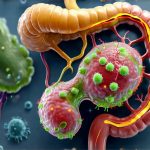Food intolerances are becoming increasingly prevalent, impacting millions worldwide with symptoms ranging from mild discomfort to debilitating digestive distress. While many assume these reactions stem directly from an allergy to specific foods—an immune system response—a growing body of research suggests a more complex interplay between our gut microbiome and how we process food. Often overlooked is the critical role played by the trillions of microorganisms residing within our digestive tract, collectively known as the gut microbiota. These microbial communities are not merely passive bystanders; they actively participate in digestion, nutrient absorption, immune regulation, and even mental wellbeing. A disruption to this delicate ecosystem, commonly referred to as gut dysbiosis or imbalance, can profoundly affect how we tolerate certain foods, leading to symptoms that mimic allergies but operate through different mechanisms.
The conventional understanding of food intolerance typically focuses on enzymatic deficiencies – like lactose intolerance where a lack of lactase prevents proper milk sugar breakdown—or sensitivities to naturally occurring compounds in food. However, this doesn’t fully explain the rising rates and diverse presentations of these intolerances. What’s becoming clearer is that the gut microbiome significantly influences our ability to digest foods effectively, break down complex carbohydrates, and manage inflammation. An imbalanced gut can compromise these functions, creating an environment where even previously well-tolerated foods trigger unpleasant reactions. This perspective shifts the focus from a simple food-specific issue to a more holistic view considering the overall health of our digestive ecosystem. If you suspect your discomfort is related to what you eat, consider identifying food intolerances that cause indigestion.
The Gut Microbiome & Digestion
The human gut is home to an astonishing diversity of microorganisms – bacteria, archaea, fungi, and viruses—that collectively form the gut microbiome. This complex community isn’t static; it’s dynamic and influenced by a multitude of factors including diet, lifestyle, genetics, and medication use (particularly antibiotics). A healthy microbiome is characterized by high diversity and a balanced representation of different microbial species. It acts as an extension of our metabolic capabilities, performing tasks that our own cells cannot accomplish on their own.
- One critical role of the gut microbiome is fermentation: breaking down complex carbohydrates like resistant starch and fiber that we lack the enzymes to digest ourselves. This process yields short-chain fatty acids (SCFAs) such as butyrate, propionate, and acetate which are vital for gut health, energy production, and immune function.
- Another essential function is modulating gut permeability – often referred to as “leaky gut.” A healthy microbiome strengthens the intestinal barrier, preventing undigested food particles and toxins from entering the bloodstream and triggering an immune response.
When this microbial balance is disrupted—through factors like a diet high in processed foods, stress, or antibiotic use—it can lead to dysbiosis. This imbalance can impair digestive processes, reduce SCFA production, compromise gut barrier integrity, and increase inflammation, all of which contribute to food intolerance symptoms. Essentially, the gut loses its capacity to efficiently process food, leading to undigested particles reaching the colon and causing fermentation, gas production, bloating, and discomfort. Sometimes even healthy diets can cause discomfort due to these imbalances.
How Gut Imbalance Triggers Food Intolerances
The link between gut imbalance and food intolerances isn’t always straightforward, but several mechanisms are increasingly recognized. One major pathway involves altered carbohydrate metabolism. Certain bacteria excel at breaking down specific carbohydrates, such as FODMAPs (Fermentable Oligosaccharides, Disaccharides, Monosaccharides And Polyols). These carbohydrates are found in a wide range of foods and can cause issues for individuals with gut dysbiosis because if the microbiome lacks the necessary enzymes to process them efficiently, they ferment excessively in the colon.
This fermentation produces gas, leading to bloating, abdominal pain, diarrhea, or constipation – hallmarks of irritable bowel syndrome (IBS) which often overlaps with food intolerances. Furthermore, an imbalanced gut can lead to small intestinal bacterial overgrowth (SIBO), where bacteria proliferate abnormally high in the digestive tract. This exacerbates carbohydrate fermentation and contributes to malabsorption issues. Beyond carbohydrates, dysbiosis can also impact protein digestion, leading to incomplete breakdown and the production of putrefactive compounds that further fuel inflammation and intolerance symptoms.
The gut microbiome’s role in immune regulation is another crucial aspect. A healthy microbiome helps “train” the immune system to distinguish between harmless food proteins and harmful invaders. In dysbiosis, this training process is disrupted, potentially leading to an overreactive immune response to food proteins that aren’t inherently allergenic—resulting in non-allergic hypersensitivity reactions resembling food intolerances. Ultimately, gut imbalance doesn’t cause a sensitivity to the food itself; it creates conditions within the digestive system where even harmless foods are perceived as threats. It is possible gut healing reverse food sensitivities with proper support and treatment.
Identifying Gut Imbalance & Food Intolerances
Pinpointing the connection between gut health and food intolerance can be challenging because symptoms often overlap with other conditions. There isn’t a single definitive test for gut imbalance, but several approaches can provide valuable insights:
- Elimination Diet: This is often the first step. It involves removing potential trigger foods from your diet for a period (typically 2-4 weeks) and then systematically reintroducing them to identify which ones cause symptoms. This should ideally be guided by a healthcare professional.
- Food Intolerance Testing: While controversial, some tests assess IgG antibody levels or measure hydrogen breath after consuming specific carbohydrates, potentially indicating malabsorption issues. However, it’s crucial to interpret these results cautiously as they aren’t always reliable indicators of true intolerance.
- Stool Analysis: Comprehensive stool testing can reveal the composition of your gut microbiome, identifying imbalances and deficiencies in beneficial bacteria. This provides a more direct assessment of gut health, but interpretation requires expertise from a qualified healthcare provider.
It is important to note that self-diagnosing food intolerances is not recommended. Working with a registered dietitian or functional medicine practitioner can help develop a personalized plan for identifying trigger foods and restoring gut balance. Can food sensitivities cause inflammation is an important question to address during diagnosis.
Restoring Gut Health & Managing Intolerances
Restoring gut health requires a multifaceted approach focusing on dietary changes, lifestyle modifications, and potentially targeted supplementation. A cornerstone of this strategy is dietary diversification. Consuming a wide variety of plant-based foods—fruits, vegetables, whole grains, legumes—provides the prebiotic fiber that fuels beneficial bacteria.
- Reducing processed food intake, sugar consumption, and excessive alcohol are also essential steps.
- Incorporating fermented foods like yogurt (with live cultures), kefir, sauerkraut, kimchi, and kombucha can introduce probiotic bacteria into your gut. However, tolerance varies greatly, so start slowly and monitor for any adverse effects.
Beyond diet, stress management techniques such as meditation, yoga, or deep breathing exercises can help reduce cortisol levels which negatively impact the microbiome. Regular physical activity also promotes a healthy gut environment. In some cases, targeted supplementation with probiotics (specific strains chosen based on individual needs) may be beneficial, but this should always be done under professional guidance. Remember that rebuilding a balanced gut microbiome is a long-term process requiring consistent effort and personalized strategies. If you experience symptoms like eye puffiness, consider can food intolerances cause eye puffiness as a possible connection.
The Future of Gut Health & Food Intolerance Research
Research into the gut microbiome’s influence on food intolerance is rapidly evolving. Scientists are beginning to identify specific bacterial strains linked to tolerance or sensitivity to particular foods, opening up possibilities for targeted interventions. Advances in metabolomics—the study of metabolic products within the body—are helping us understand how microbial metabolites impact immune function and inflammation.
Furthermore, personalized nutrition approaches tailored to an individual’s microbiome profile are gaining traction. This involves using stool analysis data to recommend dietary strategies that specifically support a healthy gut ecosystem and improve food tolerance. As our understanding deepens, we can expect more sophisticated and effective ways to address the root causes of food intolerances – not just manage symptoms—and empower individuals to enjoy a wider range of foods without discomfort. The future holds exciting possibilities for leveraging the power of the microbiome to improve digestive health and overall wellbeing. It’s also important to consider can gut sensitivities cause panic attacks as a potential symptom related to imbalance.


















